Kentucky Trivia
December 17, 1794, Kentucky created Campbell County from Harrison, Mason, and Scott and named in honor of John Campbell, Revolutionary War Colonel. The two county seats are Alexandria and Newport. Other localities include Bellevue, California, Camp Springs, Cold Spring, Crestview, Dayton, Fort Thomas, Highland Heights, Melbourne, Mentor, Silver Grove, Southgate, Wilder, and Woodlawn. The 19th County created covers 159 square miles.
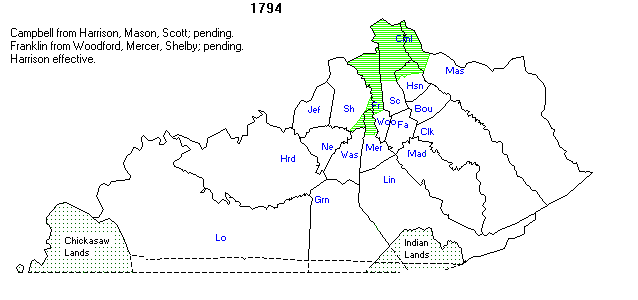 1794
1794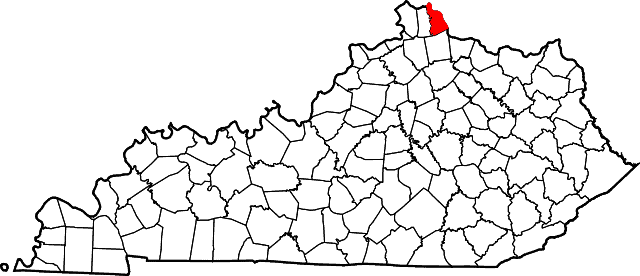 By David Benbennick
By David BenbennickDecember 17, 1796, Kentucky created Garrard County from Madison County, Lincoln County, and Mercer County and named it in honor of James Garrard, Kentucky’s 2nd governor. Lancaster is the county seat. Other localities include Bryantsville, Buckeye, Cartersville, Davis Town, Hyattsville, and Paint Lick. The 25th county created covers 234 square miles.
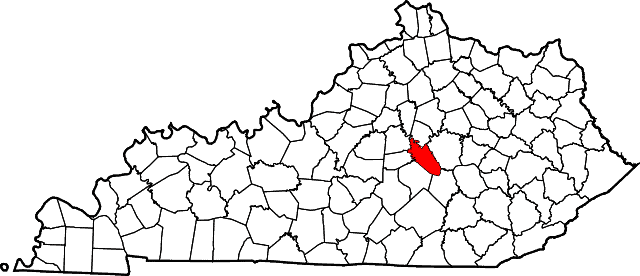 By David Benbennick
By David BenbennickDecember 17, 1798, Kentucky created Ohio County from Hardin County and named it for the Ohio River, which formed the county’s northern border. Hartford is the county seat. Other cities and towns located in the county include: Beaver Dam, Centertown, Fordsville, McHenry, Rockport, Rosine, Adaburg, Beda, Buford, Haynesville, Heflin, Herbert, Magan, Narrows, Pleasant Ridge, Reynolds Station, Shreve, Silver Beach, Taffy, Baizetown, Ceralvo, Cool Springs, Cromwell, Dundee, Echols, Equality, Horse Branch, Matanzas, Nineteen, Olaton, Prentiss, Select and Shultztown. The 38th county created covers 596 square miles.
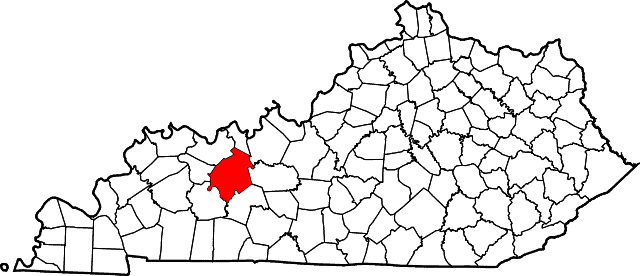 By David Benbennick
By David BenbennickDecember 17, 1821, Senator Richard Johnson helped abolish imprisonment for debt in Kentucky, becoming the 1st state to do so.
December 17, 1823, Kentucky created two counties.
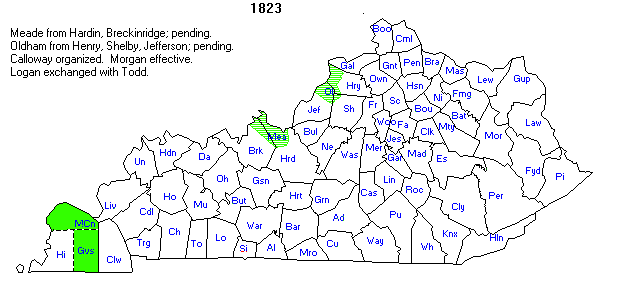
December 17, 1823, Kentucky created Graves County from Hickman County and named in honor of Benjamin F. Graves, army major killed at the Battle of Frenchtown. Mayfield is the county seat. Other communities include: Water Valley, Wingo, Fancy Farm, Farmington, Hickory, Lowes, Pryorsburg, Sedalia, Symsonia, Bell City, Boaz, Clear Springs, Cuba, Dogwood, Dublin, Dukedom (partial), Fairbanks, Feliciana, Folsomdale, Golo, Kaler, Kansas, Lynnville, Melber (partial), Natchez Trace, Pilot Oak, Pottsville, South Highland, Stubblefield, Tri City, Viola, West Viola, Westplains and Wheel. Graves County, the 74th county created, covers 557 square miles.
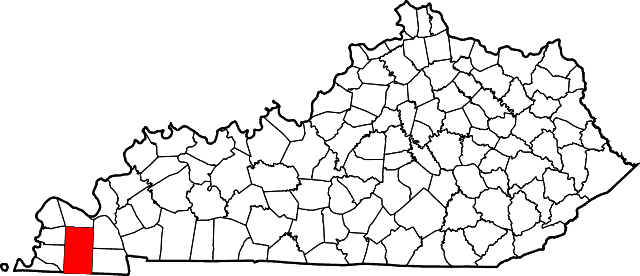 By David Benbennick
By David BenbennickDecember 17, 1823, Kentucky created Meade County from Hardin County and Breckinridge County and named it in honor of James Meade, a military captain killed at the Battle of Frenchtown. Brandenburg is the county seat. Other localities include Ekron, Muldraugh, Guston, Flaherty, Doe Valley, Fort Knox, a military base (partly in Hardin County) Battletown, Big Spring, (partly in Breckinridge County and Hardin County) Concordia, Flaherty, Garrett, Guston, Lickskillet, Meade, Payneville, Rhodelia, Rock Haven, Wolf Creek, Garnettsville, and Buck Grove. Meade County, the 77th county created, covers 305 square miles.
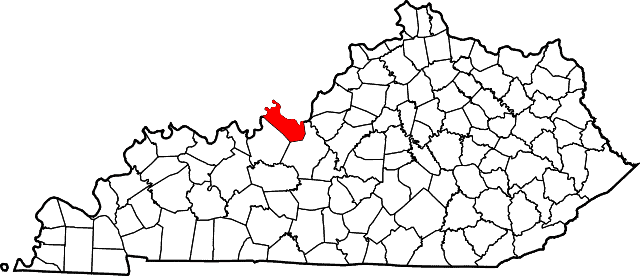 By David Benbennick
By David BenbennickDecember 17, 1851, Henry Clay (Whig) resigned his Class III U.S. Senate seat effective September 6, 1852. He died nine months and 18 days later.
December 17, 1861, the Battle of Rowlett’s Station occurred in Hart County at a railroad stop in Rowlett to fight over an iron railroad bridge, hailed as an engineering marvel, that spanned the Green River. With no clear winner in the battle, the Union stayed in control of the bridge, but the Confederates destroyed a large section. Locals estimated the casualties to be around 131 (US 40; CS 91). They fought two more times over this vital supply link. The significance of the “Battle for the Bridge” is celebrated each September during the Hart County Civil War days.
December 17, 1862, Gen. Ulysses S. Grant issued an order expelling Jews from Kentucky “as a class violating every regulation of trade established by the Treasury.” Cesar Kaskel, a haberdasher from Paducah, and others asked President A. Lincoln to revoke the order, which he did in January 1863. Jewish families have lived in Kentucky since the early 19th century. Between 1834 and 1850, the 1st significant Jewish families arrived in Louisville, Owensboro, Henderson, Madisonville, and the smaller towns of Hartford, Marion, Hickman, and Eddyville.
December 17, 1864, Confederates burned the Madisonville Courthouse in Hopkins County to the ground. Locals saved all county records.
December 17, 1925, exactly 22 years after the Wright Brothers’ 1st flight, Pikeville native John P. Riddle and T. Higbee Embry formed the Embry-Riddle Company at Lunken Airport in Cincinnati, Ohio. They met two years prior when Riddle landed at a polo field and offered Embry a ride in his plane.
December 17, 1940, Chief Deputy George Thomas Fisher, Bell County Sheriff’s Department, died as he and three other officers served a warrant on a man wanted for robbery in Alexandria, Virginia. The officers arrested the suspect eating breakfast in a trailer near Cumberland Gap. The man denied he was the man named in the warrant and requested that he be able to finish eating, which the officers let him do. The suspect suddenly produced a gun, striking Chief Deputy Fisher six times, killing him.
December 17, 1945, Deputy Warden L. R. Gumm, Kentucky Department of Corrections, died by an inmate who had smuggled a gun into the prison.
December 17, 1951, Army PFC Ralph L. Leitner from Jefferson County died in the Korean War.
On Monday, December 17, 1962, Adolph Rupp and Dean Smith coached against each other for the 1st time as head coaches for their two schools. The Tar Heels won by 86-66 in Memorial Coliseum with 11,200 in attendance.
December 17, 1966, Army 1LT Chester G. Cox from Lawrenceburg in Anderson County and Army PFC Harry T. Poland from Tompkinsville in Monroe County, both died in the Vietnam War.
December 17, 1969, Army CPL Willard E. Spivey from Franklin in Simpson County died in the Vietnam War.
December 17, 1985, Governor M.L. Collins appeared on NBC’s Today Show to boast about securing the $800 million Toyota plant. The governor talked from Lexington’s NBC affiliate conversing with Jane Pauley in New York.
December 17, 1987, President R. Reagan created the Trail of Tears as a National Historic Trail; the bill singled out Hopkinsville. In April 1996, the National Park Service designated Hopkinsville Park as a certified site on the National Historic Trail of Tears. The park is the 1st non-federal property to receive such designation.
December 17, 1993, a seven-alarm fire destroyed the Fair Ground’s grandstand. With a round-the-clock effort for 19 days, Fair Grounds erected temporary facilities and conducted racing for the remaining 60 days of their meet.
On December 17, 2004, four friends borrowed a van and robbed valuable 1st edition books from the Transylvania Library, tying up and terrorizing a librarian.
December 17, 2005, Tubby’s #23 Cats defeated Pitino’s #4 Cardinals in Rupp Area 73-61. Rajon Rondo scored 25 for the Wildcats, and Juan Palacios scored 15 for the Cards. Kentucky won wire-to-wire.
December 17, 2010, Jefferson Circuit Judge Judith McDonald-Burkman told the murderer of a four-year-old boy that the death penalty was not a harsh enough sentence; hence, she sentenced him to life in prison to be surrounded by “bigger, meaner men who have nothing to lose.” She then told the victim’s family, “he will fear for his life the rest of days.” The statement attracted national attention.
December 17, 2012, UofL officials struck a deal to pay $15 million for 15 acres where 11 iconic 94-year-old silos stood. The lot now holds classrooms and other academic facilities.
December 17, 2019, Daniel Jay Cameron served his first day as the 51st Attorney General of Kentucky, the 1st African-American, and the 1st Republican since 1943 to be elected.
December 17, 2020, the U.S. Supreme Court ruled that Kentucky can force parochial as well as public schools to close temporarily because of the coronavirus pandemic, but only because those restrictions would end soon. Governor A. Beshear ordered all public and private K-12 schools closed for in-person instruction beginning November 23, 2020.
December 17, 2021, Western Kentucky’s death toll from December 10 tornadoes climbed to 77, eclipsing the state record of 76 in 1890 in Jefferson County. Beshear said the new death toll of 77 includes one new fatality confirmed in Lyon County, another in Warren County, and three in Hopkins County that the county coroner has not yet confirmed. The governor’s prediction came true.
On December 17, 2022, Governor A. Beshear tweeted, “The Christmas season is a time for giving, and I am so grateful to those who are generously donating to our families in Eastern Kentucky affected by July’s historic flooding. This week we saw over $300,000 on Monday alone, with the fund now reaching over $12.6 million.”

